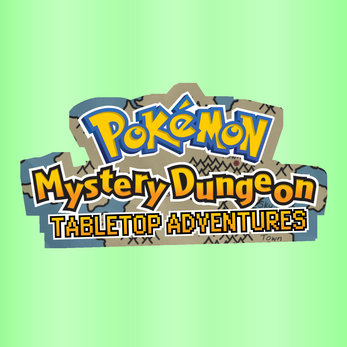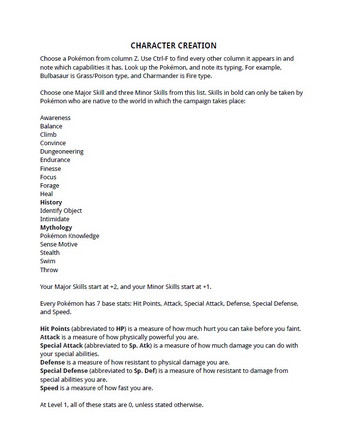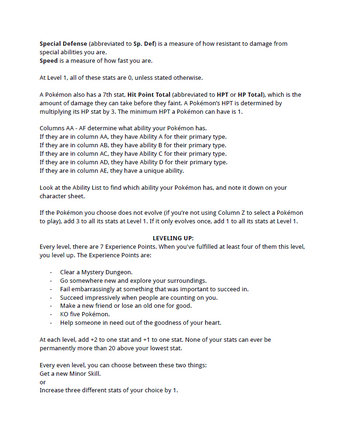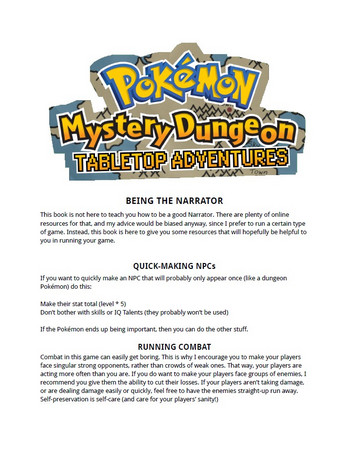Pokémon Mystery Dungeon: Tabletop Adventures
A downloadable RPG
Pokémon Mystery Dungeon: Tabletop Adventures is an intentionally simple, though somewhat math-heavy RPG (1d6 rolls, set DCs, multiplication involved in attacks) based on the Pokémon Mystery Dungeon series of games, a game series I love very much. I began writing this RPG in summer 2018 and finished it in early 2020, and I've been updating it irregularly since with the Pokémon that have been released since then. The current version features all Pokémon currently released, from Bulbasaur to Pecharunt.
This RPG will never be sold for money, given that I did not create the concept of Pokémon Mystery Dungeon.
The zip file contains:
- The Player's Guide, containing basic rules and a number of necessary lists.
- A few optional things you can use in your game if you like.
- The spreadsheet of Pokémon Capabilities and Abilities, necessary for character creation.
- An image of a world map, with a few non-canon towns added for flavor.
- A .docx-based character sheet, and a bag sheet for the party to share.
And resources for the Narrator's use:
- The Narrator's Guide to help Narrators run the game, which also contains numerous tables to roll on to randomly generate events, encounters, jobs, or loot.
- The spreadsheet of Pokémon by Habitat, allowing you to easily determine the type of Pokémon your players may encounter in particular areas of the world
- Another image of a world map, with the areas of the world that correspond to particular biomes color-coded.
I hope you enjoy!
| Status | Released |
| Category | Other |
| Rating | Rated 4.7 out of 5 stars (6 total ratings) |
| Author | alimakesrpgs |
| Genre | Role Playing |
| Tags | isekai, mystery-dungeon, pokemon, Tabletop, trpg, Tabletop role-playing game |
Download
Install instructions
Download WinRAR or 7zip in order to open the zip file.
Development log
- The Deceptively Large UpdateApr 30, 2024
- The Scarlet and Violet UpdateDec 13, 2022
- Even Quickerest UpdateFeb 12, 2022
- The Legends: Arceus UpdateFeb 12, 2022
- Quickest UpdateJan 14, 2022
- Quick Update #3May 14, 2021
- Yet another quick updateMay 14, 2021
- Quick UpdateMay 14, 2021




Comments
Log in with itch.io to leave a comment.
Is this related to Pokerole or is it a totally different system?
Nope! Not related to or in contact with Pokerole at all. Their system predates mine, I believe.
Ok. Thank you and thanks for all your work!
Maybe I'm dumb, but does the Pokémon species affect your stats?
Unless listed in the specific columns which raise a Pokémon's Defense or Speed, or listed in an Ability column corresponding to an Ability that affects their stats, a Pokémon's species does not affect their stats at all, no.
I've read the manuals, and I gotta say, it's pretty cool! Although I do have a couple of questions:
- Have you considered making some kind of quiz in order to randomize the starting Pokémon? Or is it impossible just from the amount?
- How can you advance the skills once you have chosen everything as a Major or Minor skill? The manual says "your Major skill starts at +2..." so I assume it can go up?
Apart from that, I could offer myself up to translate this game to Spanish (I'm from Spain) if you are interested, but it would take me a while.
Thanks in advance!
Glad you enjoyed it!
- I have considered making a quiz like that, but the sheer amount of Pokémon available plus the prospect of updating it every time new options come out seemed like a bit too much for one person. The most I could maybe do is have a type quiz and then randomize which Pokémon you get within that type.
- You know, I actually haven't considered skill advancement. Apart from gaining new skills from levelling, there actually isn't any way to advance skills past +2. Maybe an IQ Talent or something would work for that purpose. ("Any current and future Major Skills give +4 instead, and Minor Skills give +2"?)
If you'd like to translate the game, I'd welcome it! Let me know what materials you need and I'll be glad to send them. (And obviously I'd credit you for your work both on the game's page and in the translated versions of the documents.)
Yeah, I suspected as much about the quiz. And that's what I did with my players in the end, make a type quiz and then randomize the Pokémon hahaha. The IQ Talent sounds good, maybe to take it once they get to level 35+?
I have another question, actually: when getting the "KO five Pokémon" experience point, does it count to KO them as a group or each player individually?
And don't worry about the translation! As long as I have the manuals I don't need anything else (at least I think so), I'll inform you whenever I'm done and send you the translated version via e-mail. I'll keep you updated!
I'd say that the experience point counts for the group, since some Pokémon have utility in a fight beyond KOing opponents, and it'd be unfair to those Pokémon to have them level slower. I'll probably change the wording so it's closer to "have Pokémon in your party KO five Pokémon in fights you were present for" or similar.
Thank you very much!! When I asked if you'd need anything I mostly meant the .docx versions of the files and such.
do you plan on releasing translations? or maybe collaborating with other people to translate these to other languages?
i'd really love to use this system, but it would only be viable in portuguese
It would be nice if I could work with people to get PMDTA translated into other languages, but unfortunately there are no plans to that effect at the moment, since nobody's reached out to me to translate it, I'm flat broke so I can't really afford to pay anyone to translate it, and I wouldn't want to machine translate it because there are a lot of rules that are very specific in their meanings.
If in the future someone reaches out asking to translate it, I'd definitely approve of those efforts and support them in any way I'm able, but I can't really afford the time or money necessary to head up such an operation.
Hi there. Just found this, and have looked through it but can't seem to find the Column Z that is mentioned for the Pokemon you can choose to start playing as. Is there something I'm missing? Even using CTRL-F to find Column Z doesn't work. A bit embarrasing that I can't find it, so I'll just ask here if anyone knows where to look :D
Thanks for the help. Really looks like a fun simple system I'd like to run with a good friend of mine.
"Column Z" is the column in the Pokémon Capabilities.xlsx spreadsheet that's titled "Pokémon you can choose". It comes after "Massive Pokémon (32 ft and above)" and before "Pokémon that have ability A."
Sorry for the confusion. "Z" is what the letter at the very top of the column is, since Excel and Google Sheets organize columns in spreadsheets by letters of the alphabet. It's the 26th column, so it's Z.
Hi!
Did anyone make tools for generating encounters?
I found a few tools for map if it helps someone:
https://pokemon-dungeoneer.vercel.app
https://andrewhenley.us/projects/dungeon.html
https://shadybug.itch.io/mystery-dungen
There's some tables to generate encounters and events, both within and outside of dungeons, in the Narrator's Guide.
reading through this, i do have one note!
i think porygon should get it's own ability too, based on the whole 'conversion' gimmick. probably being able to change it's type to a target's or something
also, theres no rules on traps!
EDIT: theres also nothing noting how to calculate how much HP a pokemon character has at level one, since they cant have 0 HP at level 1
i'm about to start running this game and i'm so excited! i decided to make my own character sheet for my players, which i figured i should share here too :3
EXP is simplified to a little checkbox system, so narrators should have EXP requirements written elsewhere for the players to refer to. i'm personally homebrewing the EXP to be more like Monster of the Week (players get EXP points if they fail a roll).
feel free to make a copy of the doc!
https://docs.google.com/document/d/145L5h3d1T2O-Jg4qg2onULuG8g2hdeGkJbWlUtjcQmI/...
this is my lil boy as a test/example :D
I want to run a game using your rules but have many questions, like how to calculate the range of attacks. Is there a way to message you besides here?
I'm most active on my Tumblr, ali-dot-txt, which is linked on my itch page so I'll for sure see messages sent to me there. As for ranges, PMDTA is a "theater of the mind" system, so it's largely up to players and the Narrator whether an attack is classified as happening at range or not.
This looks absolutely awesome!! I can't wait to run it at some point. Good job!
pog
How does moves work?
LIke hyper beam And etc etc
For the sake of simplicity, this system doesn't have "moves" as such. When a Pokémon attacks, it's a simple matter of choosing whether the attack is physical (uses Atk) or special (uses Sp. Atk) and then choosing a type, if the Pokémon has multiple. You can see the rules for attacking starting under "Option 1: Attack" on page 2.
11/10 wouId pIay again. Hope you add custom stuff for movement and status moves ^-^
the simplicity of this system is amazing, this is the closest to the real PMD experience in terms of ttrpgs Ive played in the setting (and I've played most of them)
The lack of strict stats & moves makes even the strangest of pokemon choices viable, and the ease of creating player characters & combat encounters is a massive plus. The in combat math is not too difficult at all, and a simple calculator makes it a breeze.
However the loss of status moves for a strictly combat focused system is a negative. I'd suggest giving each type a utility move they can choose in combat to do instead of attacking (example: steel type could raise its defense, water type could pop an aqua ring to slowly regain HP, etc) or make those moves into TMs to add more combat strategy beyond just spamming attacks & items.
I love the way the experience system is set up, helps to reward combat avoidance & social RP, however I did make a few changes in the wording of some boxes:
Come across a place no living Pokemon has seen. -> Explore a new location you've never been to before.
the Exploring here is its own separate action, which encourages players to scour new places and gives Narrators opportunities to describe the place in detail for an engaging in-game reason & is much more reliable when compared to the other options.
Be seriously betrayed by someone you trusted -> Fail miserably at something and let others down
There's only so many times a betrayal can happen before it gets boring, it also starts feeling forced when players are expecting to be betrayed so they can rack up experience points. This also has the added bonus of rewarding failed rolls, which encourages players to make rolls for things they wouldn't attempt otherwise, which makes for better storytelling.
Thank you for the kind comment!
I agree with you on the experience points. Repeated betrayals would come off as boring after a while, especially in a longer campaign, which I hadn't considered. And the phrasing of "come across" does encourage a more passive way to experience the game.
In terms of status moves, this game originally had 4 moves per type, before I ran out of ideas halfway through. Single type-based status moves weren't something I'd considered, especially after Abilities took that role, but I do see how status moves would improve combat complexity. I'll have a look and see if I've got enough ideas to fill out a type chart. If not, I might make a list of typeless status moves, since STAB wouldn't affect them anyway. Thanks again!
In playing this system a bit more I thought I would add a few of the other changes I made that improved the gameplay experience:
I found the skill rolls to be a bit too predictable after a +2 bonus (since you basically can't fail after that point) so instead of using the proficiency as a straight bonus to the roll itself, I changed it so proficiency just adds the number of dice you roll. I gave various tasks a success threshold (1 for easy tasks, 2 for more complicated, 3 for very difficult) and each dice roll can add various amounts of successes based on the result (6s give 2 successes, 5/4s give 1 success, 3/2s give 0 successes, and 1s subtract a success) This helped to add more unpredictability to skill rolls, allowed for more complex skill thresholds, and still rewarded skill investment.
Stats got to be a problem in combat whenever a target's defensive stats were just too high, turning combat into a long slog of throwing d6 after d6 only to do between 1-4 damage, so I revamped the character creation & level up system for stats. I had each player roll six batches of 6d6-5 (range of 1-31) to determine their IVs, then had them pick a nature (which I also used to reward inspiration points whenever they RP'd within that chosen nature which could be redeemed for a reroll of any roll) and then used their species to calculate their stat totals. I still kept the existing stat system for level ups, but I turned them into EV stats (which I also used to reward players for engaging in combat with minor stat boosts over time)
If you want any help coming up with various move ideas for the types I'd love to help with the brainstorming process. The way I did it in game is I gave my players the ability to come up with their own moves (limited to four total) that they could define based on their character's type, species, personality, or skills. For instance: one character is a pickpocket so they were allowed a thief-like move to steal items/poke from targets.
about a month late XD but a thought I had with the system and the +2 to stats was.. would it work to tune the rolls to a 2d6 Powered By The Apocalypse style? Like…
2-6: miss/GM makes a (doesn’t have to be a full fall, but the GM does get to complicate things
7-9: partial success
10+: full success (maybe 12+ is crit?)
Can cap the skills at +2, major skills start at +1, minor skills at 0, rest at-1? Balancing that with the bonuses from characteristics, I’m not sure of, perhaps if your characteristic increases the cap of that stat to +3? might that reduce that feeling inability to miss while keeping rolls somewhat simple?
Though got to ask a quick question how do moves work in this system? it has me a bit confused.
"Moves" as they exist in the game don't exist in PMDTA. Instead, when you attack a target, you choose whether to use Attack or Special Attack, and choose which of your types to use (if you have more than one). Then you multiply your attack stat by the modifiers applied to it (if the attack is super effective or you have only the one type, etc) and subtract the target's Defense or Special Defense stat from it (Minimum damage dealt is 1).
Hm, now that I write it out it seems very complicated, but it flowed pretty well in the playtests.
This is pretty fucking cool